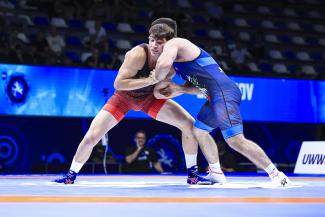Andreu Ortega and Goleij Seek Second U23 World Titles
Monday, October 28, 2019 - 20:54 By Taylor Miller

Photo: Reineri ANDREU ORTEGA (CUB). / Photo: Kadir Caliskan
BUDAPEST, Hungary – Two men’s freestyle athletes and 2017 U23 World champions, Reineri ANDREU ORTEGA (CUB) at 57 kg and Mojtaba GOLEIJ (IRI) at 97 kg, seek to earn their second U23 World gold medals on Tuesday in Budapest, Hungary.
Both Andreu Ortega and Goleij won their first U23 World titles in 2017.
At 57 kg, Andreu Ortega will return to the U23 gold-medal finals, thanks to three wins on Monday in Budapest.
After taking out 2016 Junior World champion Afgan Smail KHASHALOV (AZE) in the first round and 2018 U23 World bronze medalist Wanhao ZOU (CHN) in the quarterfinals, Andreu Ortega battled 2019 Russian Nationals champion Ramiz GAMZATOV (RUS).
Trailing 1-0 at the break, Andreu Ortega used a takedown, trapped-arm gut and a four-point takedown for an 8-2 win and a spot in the finals.
Tomorrow for gold, Andreu Ortega will face 2019 Junior World bronze medalist and 2017 Cadet World bronze medalist Adlan ASKAROV (KAZ).
Askarov had several close battles on the day, including his semifinal match against Alireza Nosratolha SARLAK (IRI).
Sarlak led 3-1 late in the second period, but with less than 20 seconds left, Askarov scored a takedown to take the lead and secure a 3-3 win on criteria.

Photo of Mojtaba GOLEIJ (IRI). Photo: Kadir Caliskan
Wrestling at 97 kg, Goleij had a big day, opening his day with an 11-0 win against Lukas KRASAUSKAS (LTU). In the quarterfinals, Goleij took down 2018 U23 World champion Givi MATCHARASHVILI (GEO) in an 8-6 decision.
To move onto the finals, Goleij put together a decisive 8-2 win against Dzianis KHRAMIANKOU (BLR) in a rematch of the 2017 U23 World gold-medal match.
In his finals bout tomorrow, Goleij will face 2017 Junior World champion Shamil MUSAEV (RUS), who was dominant in his opening day of competition, picking up three-straight technical falls, including a 12-0 victory over Serik BAKYTKHANOV (KAZ) in the quarterfinals.

Photo of Tariel GAPHRINDASHVILI (GEO). Photo: Kadir Caliskan
2018 Cadet World champion Turan BAYRAMOV (AZE) seeks his second-career World title, advancing to the 65 kg finals.
Bayramov, a 2019 Junior World bronze medalist and a 2017 Cadet World silver medalist, outlasted Ilman MUKHTAROV (FRA) in the semifinals tonight, scoring a second-period takedown to give him a 2-1 advantage.
For gold, Bayramov will take on 2018 Junior Asian champion Takuma TANIYAMA (JPN). In his semifinal, Taniyama held off Ernazar AKMATALIEV (KGZ) with a 4-3 decision.
Mirza SKHULUKHIA (GEO) locked up his second U23 World medal by battling his way to the 70 kg finals. He was a bronze medalist at the 2017 U23 World Championships.
For the 70 kg title, Skhulukhia will go head-to-head with Cherman VALIEV (RUS), who did not give up a single point in his first four matches of the tournament. He outscored his opponents on Monday, 39-0, including a 10-0 win over Amirhossein HOSSEINI (IRI) in the semifinals.
Wrestling in the gold bout at 79 kg is 2016 Junior World bronze medalist Tariel GAPHRINDASHVILI (GEO) and three-time World medalist Abubakr ABAKAROV (AZE).
Abakarov is a 2016 Cadet World champion, 2018 Junior World silver medalist and a 2019 Junior World bronze medalist.
The finals will take place at 6 p.m. on Tuesday. Fans can watch live on unitedworldwrestling.org.
Semifinals results
57 kg
Reineri ANDREU ORTEGA (CUB) df. Ramiz GAMZATOV (RUS), 8-2
Adlan ASKAROV (KAZ) df. Alireza SARLAK (IRI), 3-3
65 kg
Turan BAYRAMOV (AZE) df. Ilman MUKHTAROV (FRA), 2-1
Takuma TANIYAMA (JPN) df. Ernazar AKMATALIEV (KGZ), 4-3
70 kg
Mirza SKHULUKHIA (GEO) df. Oleksii BORUTA (UKR), 9-5
Cherman VALIEV (RUS) df. Amirhossein HOSSEINI (IRI), 10-0
79 kg
Tariel GAPHRINDASHVILI (GEO) df. Ramazan SARI (TUR), 10-6
Abubakr ABAKAROV (AZE) df. Ver Dev GULIA (IND), 8-1
97 kg
Mojtaba GOLEIJ (IRI) df. Dzianis KHRAMIANKOU (BLR), 8-2
Shamil MUSAEV (RUS) df. Danylo STASIUK (UKR), 13-2
Finals matchups
57 kg: Reineri ANDREU ORTEGA (CUB) vs. Adlan ASKAROV (KAZ)
65 kg: Turan BAYRAMOV (AZE) vs. Takuma TANIYAMA (JPN)
70 kg: Mirza SKHULUKHIA (GEO) vs. Cherman VALIEV (RUS)
79 kg: Tariel GAPHRINDASHVILI (GEO) vs. Abubakr ABAKAROV (AZE)
97 kg: Mojtaba GOLEIJ (IRI) vs. Shamil MUSAEV (RUS)


Share your thoughts.
Comments